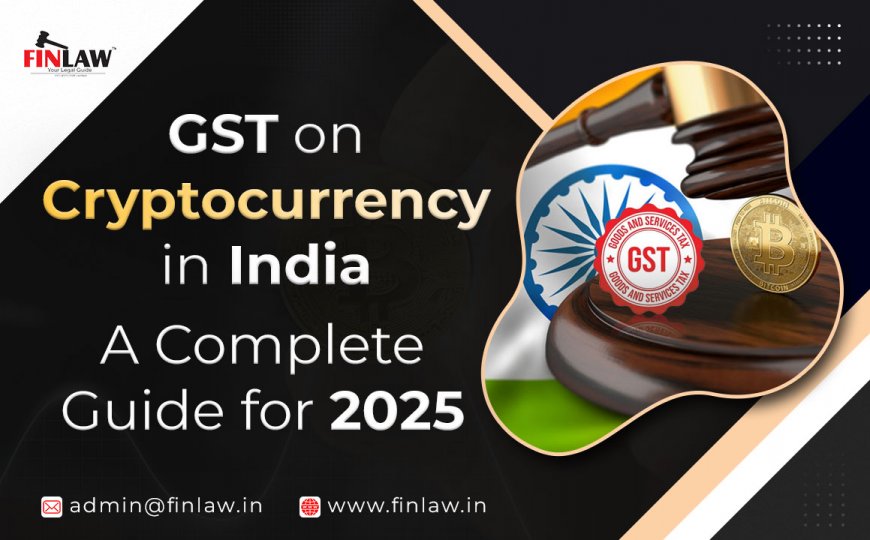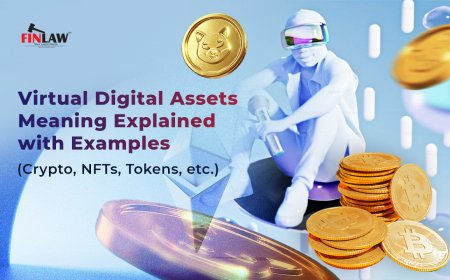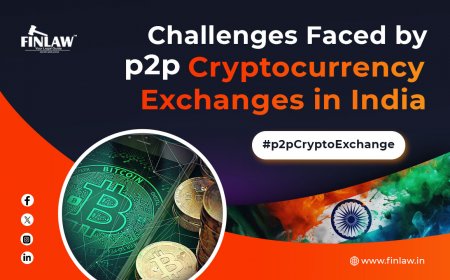GST on Cryptocurrency in India: A Complete Guide for 2025
Learn everything about GST on cryptocurrency in India. Discover GST rates, compliance requirements, impact on traders & businesses, and recent government clarifications.

Introduction
The Indian cryptocurrency market has seen exponential growth over the past few years, attracting millions of users and significant investment. With this surge, tax authorities have moved swiftly to regulate and tax crypto transactions more comprehensively. While the income tax regime for cryptocurrencies was introduced in 2022, the government’s recent clarification in July 2025 on Goods and Services Tax (GST) applicability has brought another important change.
Understanding GST on cryptocurrency is now crucial for anyone involved in crypto trading, mining, exchanges, and businesses accepting crypto payments. This guide explains the current GST framework, practical implications, compliance requirements, and key updates for 2025, helping you stay informed and legally compliant.
Overview of GST on Cryptocurrency in India
What is GST?
Goods and Services Tax (GST) is a comprehensive indirect tax on the supply of goods and services in India. It’s a destination-based tax designed to replace multiple indirect taxes with a unified structure, generally levied at 5%, 12%, 18%, or 28%, depending on the goods or services category.
Why Does GST Apply to Cryptocurrency?
Cryptocurrency transactions typically involve services such as exchange operations, wallet custody, advisory, and other platform fees. Since these services are supply of services under GST law, they attract GST at applicable rates.
The government has confirmed that cryptocurrency exchange platforms must charge GST at 18% on their service fees. This clarification came in response to ambiguities about whether crypto trading is akin to currency exchange (usually exempt) or a supply of intangible goods (taxable).
Detailed GST Applicability on Cryptocurrency Transactions
GST on Crypto Exchange Services
Cryptocurrency exchanges provide various services to users, including:
-
Trading and transaction facilitation
-
Listing new tokens
-
Wallet management and custody
-
Advisory and other ancillary services
These services are taxable at 18% GST. For example, the trading fee you pay to a crypto exchange will have an additional 18% GST levied on it.
Example:
If you pay ₹500 as a trading fee, the GST at 18% would be ₹90, making your total cost ₹590.
GST on Supply of Cryptocurrency Itself
The treatment of the cryptocurrency token itself under GST is still a legal gray area:
-
If cryptocurrencies are treated like currency or money, GST generally does not apply on supply since financial transactions are mostly exempt.
-
However, many tax experts argue that cryptocurrencies are intangible goods under GST law, making their supply taxable at 18%.
Currently, no definitive notification exists from the GST Council or the Central Board of Indirect Taxes and Customs (CBIC) that explicitly clarifies this. Hence, traders and businesses should keep a cautious approach, maintain thorough records, and consult tax professionals.
GST on Mining Services and Other Crypto Activities
-
Crypto mining services may be considered supply of service and attract GST.
-
NFT (Non-Fungible Token) trading and other digital asset services may also attract GST at 18%.
-
Developers providing blockchain infrastructure or smart contract services are liable to GST on fees or subscription charges.
Income Tax vs GST: Understanding the Difference
While GST is an indirect tax on services related to cryptocurrency, income tax applies to the gains or profits made from buying and selling cryptocurrencies.
-
Income tax: Gains from cryptocurrency transactions are taxed at a flat 30% plus applicable cess and surcharge under Section 115BBH.
-
GST: Applies on service fees charged by exchanges or other crypto-related services at 18%.
Important: GST is levied on fees, not on profits made from the underlying crypto assets. However, GST increases overall trading costs, which traders must factor into profitability calculations.
Registration and Compliance Requirements for GST on Cryptocurrency
Who Must Register?
-
Any Indian crypto exchange or platform providing services must register under GST once turnover exceeds ₹20 lakhs (₹10 lakhs for special category states).
-
Foreign exchanges supplying taxable services to Indian residents may be subject to GST under the reverse charge mechanism.
-
Businesses accepting cryptocurrency payments as consideration for goods or services also need to consider GST compliance.
Invoicing and Filing
-
Registered persons must issue GST-compliant invoices including GSTIN, taxable value, GST rate (18%), and amount.
-
Filing of monthly or quarterly GST returns with the CBIC is mandatory.
-
Input Tax Credit (ITC) on GST paid can be claimed only if the GST paid is on inputs used for taxable supplies.
Practical Implications for Traders, Exchanges, and Businesses
For Crypto Traders
-
Factor in 18% GST on all exchange fees while calculating your trading costs.
-
Keep detailed transaction records with timestamps, INR values, and fee breakdowns.
-
Be aware of the 1% TDS on crypto transactions and 30% income tax on gains.
For Crypto Exchanges
-
Implement GST registration and invoicing systems to comply with the 18% GST on service fees.
-
Work with tax advisors to ensure correct GST classification and timely return filing.
-
Educate users about GST implications on fees charged.
For Businesses Accepting Crypto Payments
-
Treat crypto received as payment as consideration in INR equivalent at the time of supply.
-
Charge GST on the supply of goods or services as applicable.
-
Maintain invoices and accounting records reflecting GST on supplies.
Common Questions About GST on Cryptocurrency
Q1: Is GST applicable on buying or selling cryptocurrencies?
GST applies on the fees and services related to crypto transactions, such as exchange fees. Whether GST applies directly to the transfer of the crypto token itself remains unsettled.
Q2: Can traders claim GST credit on fees paid?
Input Tax Credit (ITC) is typically not available to individual traders but may be claimed by businesses if the crypto-related activities form part of their taxable business supplies.
Q3: How does the 1% TDS interact with GST on cryptocurrency?
TDS at 1% applies on the sale/transfer of crypto assets as per income tax rules. GST is charged on service fees separately. Both are independent tax provisions.
Future Outlook and Regulatory Watch
-
The government is expected to clarify the GST treatment of cryptocurrencies more explicitly in upcoming GST Council meetings.
-
Courts and tax authorities are likely to deliver judgments on the classification of VDAs under GST law, shaping future compliance requirements.
-
Growing international standards around crypto taxation and GST-like taxes may influence India’s approach.
-
Exchanges and businesses should keep abreast of circulars from CBIC and Ministry of Finance for updates.
Summary Table: GST on Cryptocurrency in India (2025)
|
Aspect |
GST Applicability |
Rate |
Notes |
|
Exchange Fees/Services |
Yes |
18% |
Mandatory GST on trading, listing, custody fees. |
|
Supply of Crypto Tokens |
Unclear (debated) |
Possibly 18% if intangible goods |
Awaiting official clarification. |
|
Crypto Mining Services |
Yes |
18% |
Considered supply of service. |
|
NFTs and Digital Assets |
Yes |
18% |
Taxable as supply of service/goods. |
|
Businesses Accepting Crypto |
Yes (on goods/services) |
As per product/service |
Invoice & GST on INR value of supply. |
Final Thoughts
GST on cryptocurrency services is now an integral part of India’s crypto taxation framework in 2025. While the government has provided some clarity on the taxation of exchange fees and related services, the full picture—especially concerning the underlying crypto tokens—remains evolving.
Active traders, exchanges, and crypto businesses must adopt robust accounting and compliance measures to avoid penalties and optimize tax efficiency. Staying informed about ongoing regulatory changes and seeking expert tax advice will be critical as India’s crypto ecosystem matures.
What's Your Reaction?



















